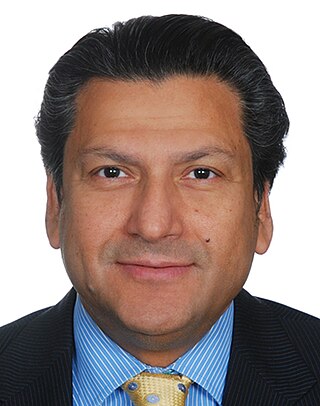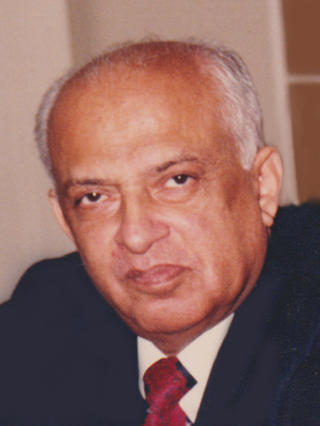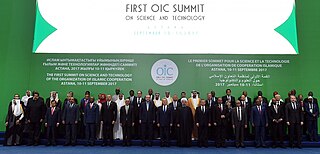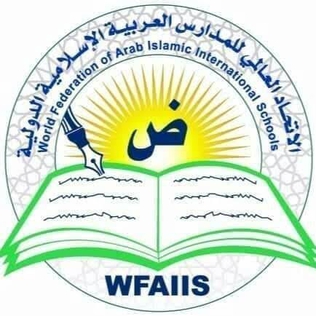
The Organisation of Islamic Cooperation, formerly the Organisation of the Islamic Conference, is an intergovernmental organization founded in 1969, consisting of 57 member states, with 48 being Muslim-majority countries. The organisation states that it is "the collective voice of the Muslim world" and works to "safeguard and protect the interests of the Muslim world in the spirit of promoting international peace and harmony".

The Economic Cooperation Organization or ECO is an Asian political and economic intergovernmental organization that was founded in 1985 in Tehran by the leaders of Iran, Pakistan, and Turkey. It provides a platform to discuss ways to improve development and promote trade and investment opportunities. The ECO is an ad hoc organisation under the United Nations Charter. The objective is to establish a single market for goods and services, much like the European Union. After the dissolution of the Soviet Union, the ECO expanded to include Afghanistan, Azerbaijan, Kazakhstan, Kyrgyzstan, Tajikistan, Turkmenistan, and Uzbekistan in 1992.

The Islamic World Educational, Scientific and Cultural Organization is a specialized organization that operates under the aegis of the Organization of Islamic Cooperation (OIC), and is concerned with fields of education, science, culture and communication in Islamic countries in order to support and strengthen relations among Member States. The Organization's headquarters is located in Rabat, Morocco, and its Director General is Dr. Salim M. Almalik.

Ekmeleddin Mehmet İhsanoğlu is a Turkish academic, diplomat and politician who was Secretary-General of the Organisation of Islamic Cooperation (OIC) from 2004 to 2014. He is also an author and editor of academic journals and advocate of intercultural dialogue.

International Islamic Fiqh Academy is an international Islamic institution for the advanced study of Islamic jurisprudence and law based in Jeddah, Saudi Arabia. It was founded following a resolution by the Third Islamic Summit Conference of the Organization of Islamic Cooperation, held in Mecca, that called for the establishment of an Islamic Fiqh Academy. The International Islamic Fiqh Academy was established in June 1983 as a subsidiary organ of the Organization of Islamic Cooperation. It consists of 57 member states and representatives.
Standing Committee for Scientific and Technological Cooperation (COMSTECH) is one of four standing committees of the Organisation of Islamic Cooperation dedicated to the promotion and cooperation of science and technology activities among the OIC member states.

The Islamic World Academy of Sciences (IAS) is a non-profit organisation of scientists and technologists that works for the promotion of science and technology in the Islamic world. It was founded in 1986.
Iranian Research Organization for Science and Technology (IROST) is a comprehensive science policy research center directly attached to the Ministry of Science, Research and Technology of Iran which was approved and ratified by Revolutionary Council of Iran in 1980. IROST is the biggest research center in Iran and is particularly engaged in development of strategies, policies, R&D systems, management, foresight and evaluation of related Science and Technology (S&T) development and S&T for economic progress.
The Islamic Solidarity Games is a multinational, multi-sport event. The Games involve the elite athletes of the Organisation of Islamic Cooperation who compete in a variety of sports. The Solidarity Games were initially created to strengthen Islamic camaraderie and reinforce the values of Islam, primarily to the youth. The Islamic Solidarity Sports Federation (ISSF) and the Organization of the Islamic Cooperation (OIC) is the organization that is responsible for the direction and control of the Islamic Solidarity Games. The ISSF strives to improve Islamic solidarity, promote Islamic identity in sports and help reduce discrimination toward Muslims.

Shahid Kamal is a retired Pakistani career diplomat. Over his career, he worked in the Ministry of Foreign Affairs; Prime Minister’s Office, United Nations, Organization of Islamic Cooperation (OIC) and Pakistani diplomatic missions in Paris, New York, Washington, Stockholm and Berlin.

The Organisation of Islamic Cooperation founded in 1969 has 57 members, 56 of which are also member states of the United Nations, with 49 countries being Muslim majority countries. Some member countries, especially in West Africa and South America, are – though with large Muslim populations – not necessarily Muslim majority countries. A few countries with significant Muslim populations, such as Russia and Thailand, sit as Observer States.

Mumtaz Ali Kazi, popularly known as M.A. Kazi, was one of Pakistan's leading scientists and educators. He was President of the Pakistan Academy of Sciences from 1978 to 1988 and President of the Chemical Society of Pakistan from 1977 to 1990.
In 1991, Azerbaijan joined the Organisation of Islamic Cooperation and started to build relations with the organization. As a result, the ambassador of Azerbaijan to Saudi Arabia was given a mandate of permanent representative of Azerbaijan to the General Secretariat of the OIC in May 1994.

First Summit of the Organization of Islamic Cooperation on Science and Technology The first OIC Summit took place on September 10–11, 2017 under the slogan "Science, Technology, Innovation and Modernization in the Islamic World" and was coincided with the closure of The International specialized exhibition Expo 2017.

The Research Centre For Islamic History, Art and Culture, also known as the Istanbul Research Center for Islamic Culture and Arts is the first cultural centre and a subsidiary organ of the Organisation of Islamic Cooperation established in 1979 after the Republic of Turkey proposed IRCICA in the 7th Islamic Conference of Foreign Ministers, in Istanbul, 1976. The proposal was adopted by the OIC under the resolution no. 3/7-ECS. It formally started inaugural functioning on 23 May 1982.
Islamic Organisation for Food Security, is a food and agriculture organization and one of the eight specialized institutions of the Organisation of Islamic Cooperation focused on the development of agriculture and rural development with primary focus on widespread scarcity of food and food security of the member states. Its charter is formally signed by the 37 member states out of 57 as of 2022. The associated member states work in collaboration with IOFS.
Al-Quds Committee, also known by its affiliated arm name adopted in 1995, Bayt Mal Al Quds Agency, is an intergovernmental organization and one of the 4 standing committees of the Organisation of Islamic Cooperation established in July 1975. It is focused on cultural, political, social, religious and human rights issues in Jerusalem caused by the Israeli–Palestinian conflict. Its principles are predominantly focused on the protection of Al-Aqsa Mosque, and cultural heritage of the city in addition to serving as an advocacy agency specialized in humanitarian and social works, concerning health, education housing children's as well as women's rights.

Women Development Organization, is an intergovernmental organisation and one of the eight specialized institutions of the Organisation of Islamic Cooperation focused on conducting major steps for women's development. It plays a central role in structuring and maintaining internal regulations for women's empowerment with the 15 Islamic countries out of 57 member states. It is principally focused on four standards, including women's role in combating extremism, women in positions of power and decision-making, women's protection against violence, and women's empowerment, economic development and financial inclusion.

World Federation of Arabo-Islamic International Schools, also known as the World Federation of International Arab Islamic Schools or International Arab-Islamic Schools Federation, is an intergovernmental, international, and one of the 17 affiliated organizations of the Organisation of Islamic Cooperation that represents Arab Islamic schools and branches across the world and 57 member states. The federation has maintained a supportive environment focused on the promotion and providing assistance to Arab educational institutions. It is principally focused on dissemination of the Islamic culture, Arabic languages, the Quran in the schools and cultural centers.

The Charter of the Organisation of Islamic Cooperation, commonly known as OIC Charter, is the foundational treaty of the Organisation of Islamic Cooperation. Its foundational principles are based on 18 chapters that objectively maintains the purpose, focus, functions, and foundation of the OIC, an intergovernmental organization founded in 1969. The charter was formally signed on 25 September 1969 by the 57 member states, including 5 observer states. However, it was revised by the 11th summit held in Dakar, Senegal on 14 March 2008.











